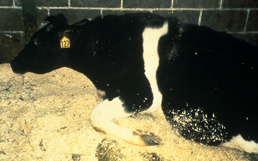Visual Illusion
People with more brain space devoted to vision are less easily fooled by an optical illusion.

People with more brain space devoted to vision are less easily fooled by an optical illusion.
Brain development in the first year of a baby's life set us apart from our extinct Neanderthal relatives.
Bacterial poison darts, a new approach to cancer research, turning skin into blood, depressing night-lights and the differences between human and Neanderthal brains.
Magnetically stimulating one part of the brain affects which hand people use for a task.
Researchers are starting to understand why Parkinson's disease disrupts signals between the brain and muscles.
Genetics influences whether you smell a distinctive odor in your urine after eating asparagus.

PSYCHOLOGY: Why listening to half of a cell phone conversation is so distracting, how we choose which hand to use, why we'll pay more if we can touch a product, and the mechanisms behind a fast-acting antidepressant.
Overhearing one end of a cell phone conversation may distract you in ways that a two-way conversation wouldn't.

ANIMALS: How dolphins breathe, sea snails that hide their gender, the genetics and epigenetics of ant colonies, and looking mad-cow disease in the eye.
We can easily be fooled into thinking we've done something that we haven't, according to a new study.
ANIMALS: A new way to sample dolphin DNA, pain-relief from sea snail venom, beetles born with bifocals, and why pigeons bob their heads when they walk.
Stimulating a rat's whiskers after inducing stroke completely prevented brain damage.
The size of different brain structures is related to how neurotic, outgoing or friendly we are.
Deciphering orangutan gestures, ancient bite marks, our innate sense of direction, and why Archaeopteryx might not have been able to fly.
Researchers are testing a vaccine that could block the pleasurable effects of smoking.
The brains of healthy creative people share some similarities with those of schizophrenia patients.
Researchers test a smoking vaccine, the relationship between schizophrenia and creativity, and post-partum depression in men.
